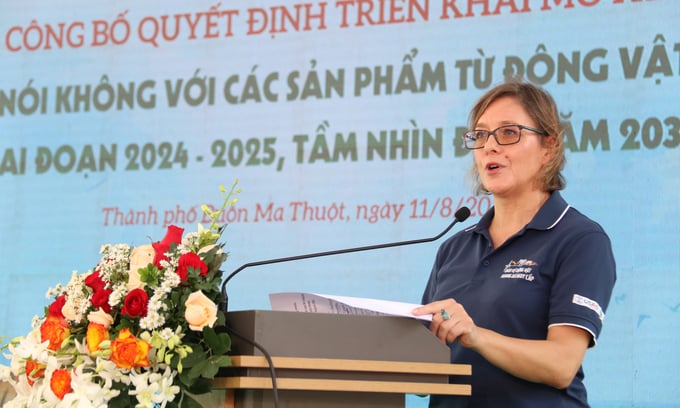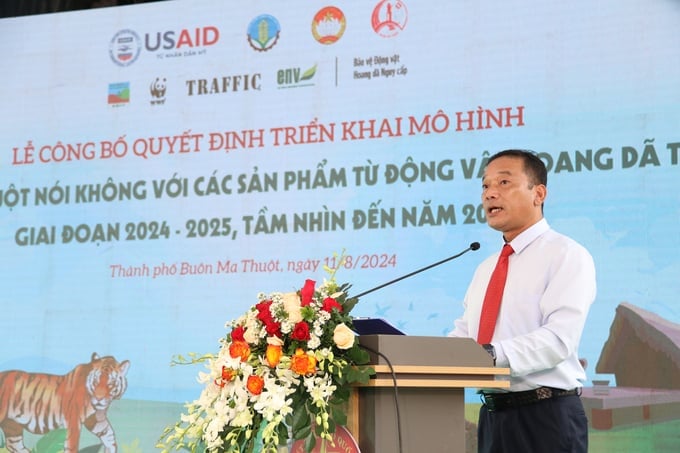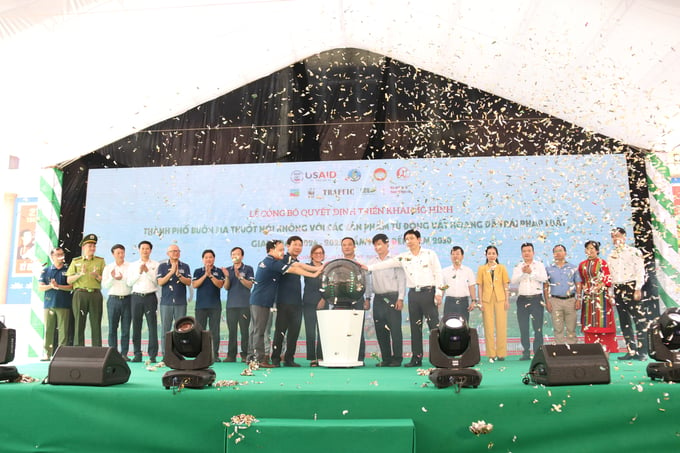May 16, 2025 | 10:27 GMT +7
May 16, 2025 | 10:27 GMT +7
Hotline: 0913.378.918
May 16, 2025 | 10:27 GMT +7
Hotline: 0913.378.918
The Dak Lak Provincial Fatherland Front Committee, in coordination with Buon Ma Thuot City People's Committee, organized a ceremony on the morning of August 11 to announce the launch of the program "Buon Ma Thuot City says NO to illegal wildlife products." As part of the commemoration of World Elephant Day in 2024, the program will be implemented from 2024 to 2025, with a vision towards 2030.
The program represents significant progress in Dak Lak province's efforts to combat wildlife trafficking and the illegal trade of wildlife products. The program has received support from the United States Agency for International Development (USAID) through the Saving Threatened Wildlife Project. Additionally, the Management Board of Forestry Projects under the Ministry of Agriculture and Rural Development will assume the role of project manager, with the World Wildlife Fund (WWF) as its facilitator.

Michelle Owen, Chief of Party of the Saving Threatened Wildlife Project (WWF), giving a presentation at the ceremony. Photo: Quang Yen.
Prior to the announcement, the Dak Lak Provincial Fatherland Front Committee and WWF conducted field surveys of markets and shops throughout the city. The results revealed that illegal wildlife trafficking activities are prevalent across numerous locations in Buon Ma Thuot city.
Among the 13 out of 16 districts (81.3%) surveyed, at least one facility in each district has involvements in illegal wildlife trade activities. Furthermore, approximately 44% of the surveyed locations, including restaurants, pet shops, and traditional medicine stores, engaged in illegal wildlife trade activities.
The survey also highlighted illegal wildlife trade activities involving live animals and wildlife products. Affected targets include 20 species protected under Decree No. 06/2019/ND-CP, 14 species listed in the 2007 Vietnam's Red Data Book, and 41 species listed in the IUCN Red List of Threatened Species, including species classified as critically endangered and endangered.

Y Giang Gry Nie Knong, Chairman of the Dak Lak Provincial Fatherland Front Committee, affirmed that the local government is committed to enhancing awareness regarding wildlife protection. Photo: Quang Yen.
In response to this issue, the Dak Lak Provincial Fatherland Front Committee issued a decision on June 24 to implement the program "Buon Ma Thuot City says NO to illegal wildlife products," which will be implemented from 2024 to 2025, with a vision towards 2030.
This program aims to enhance public awareness in the city regarding regulations pertaining to the trade and consumption of wildlife products. Moreover, the program will collaborate with businesses to prevent the illegal trading of wildlife products, and seek increased engagement from law enforcement agencies to confiscate prohibited items and prosecute unlawful activities.
According to Y Giang Gry Nie Knong, Chairman of the Dak Lak Provincial Fatherland Front Committee, support from USAID and the Ministry of Agriculture and Rural Development highlights the importance and impact of local efforts in eradicating wildlife trafficking. "We pledge to collaborating with Buon Ma Thuot city and local governments to raise awareness and ensure that the message of this program reaches all residents of Buon Ma Thuot," Chairman Y Giang affirmed.

Participants of the ceremony pressing the button to launch the program. Photo: Quang Yen.
According to Be Trung Anh, Standing Member of the National Council for Ethnic Affairs, the program in Buon Ma Thuot city highlights the close cooperation between the U.S. government and the Vietnamese government in economic and cultural fields and in nature conservation.
"These activities will strengthen the newly upgraded comprehensive strategic partnership between the two countries. Furthermore, they reaffirm Vietnam's commitment to cooperating with international partners to drastically and progressively eliminate illegal wildlife trafficking; thereby building a sustainable environment for future generations," Trung Anh added.
During her speech at the ceremony, Michelle Owen, Chief of Party of the Saving Threatened Wildlife Project at WWF, remarked that the USAID's project is honored to support the implementation of the "Buon Ma Thuot City says NO to illegal wildlife products" program. "We expect that with the collective efforts of all stakeholders, Buon Ma Thuot will become a model for combating illegal wildlife trafficking, and an example for other provinces and cities to follow," Michelle Owen shared her outlook.

Participants posing for commemorative photos and participating in a cycling event in support of the initiative. Photo: Quang Yen.
According to the local government, the launch ceremony has raised public awareness regarding the importance of protecting endangered wildlife through an extensive range of activities, including: installing advertising boards throughout the city; hosting an exhibition on illegal wildlife trafficking and conservation efforts in Dak Lak; organizing a cycling charity event; and calling for collective actions to reduce demand for illegal wildlife products.
Translated by Nguyen Hai Long

(VAN) Cold-barn systems efficiently manage environmental and temperature conditions, which aids in the prevention of respiratory diseases in pigs and protects them from the vectors that transmit African swine fevers.

(VAN) To tackle challenges, the project 'Addressing key technical bottlenecks in the grouper supply chain in Vietnam' has been underway since 2024.

(VAN) The project 'Disease-Resilient and Sustainable Cassava Production Systems in the Mekong Region', funded by the Australian Center for International Agricultural Research (ACIAR), is being implemented from 2024 to 2028.

(VAN) Data from 10,000 farming households will help professionalize production organization and support the implementation of the One Million Hectares Program for High-Quality, Low-Emission Rice Cultivation.

(VAN) FAO Director-General QU Dongyu marks International Day of Plant Health at NENA conference.

(VAN) Deputy Minister of Agriculture and Environment Hoang Trung affirmed that floriculture and ornamental plants are a growing industry that receives significant global attention.

(VAN) The three staple crops dominating modern diets – corn, rice and wheat – are familiar to Americans. However, fourth place is held by a dark horse: cassava.